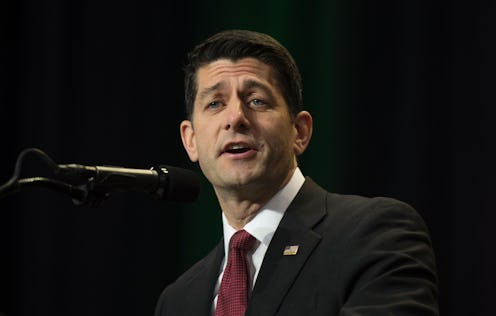News
Paul Ryan Is Out Of Touch With Reality On This

Speaker of the House Paul Ryan clearly does not like the idea of members of Congress using their smartphones to give the public a closer look at the process, that much is clear. This week, Ryan introduced legislation which would impose fines on any representative who does either, drawing pushback from the Democrats, who blasted his proposal as an "unconstitutional gag rule." Of course, if you're wondering why Ryan wants to stop House floor photos and videos, you don't have to go too far back into recent history to figure it out.
It was back in June, when Democratic representatives staged a sit-in on the House floor to demand votes on gun control legislation, most prominently and specifically on preventing people on no-fly lists from being able to purchase firearms. The protesting effort was led by Georgia Congressman John Lewis, someone who knows a little something about public protest.
And though Ryan and the Republicans recessed the House and cut the broadcast (as the majority party, the GOP controls when the TV cameras are switched on), the sit-in went viral as Democratic representatives started streaming and documenting the proceedings on apps like Periscope and Twitter. That's precisely what Ryan is hoping to keep from happening again, by passing a bill imposing monetary penalties for doing so.
The proposal would reportedly set forth a $500 fine for first-time violations — taking pictures, streaming video, or recording audio from the House floor — which then rises to $2,500 for any subsequent offenses. Needless to say, while congresspeople are typically thought of as being the American elite, and many of them are quite wealthy, there's only so many $2,500 checks anyone's going to want to write over their Periscope habits.
It's nonetheless a glaring restriction, though, and on a gut level, it somewhat smacks of secrecy and cutting access. The simple reality nowadays is that everyone is carrying their own tiny TV station around in their pockets with them, and trying to legislate that fact into irrelevance — in order to keep the public from seeing what's happening within the halls of its own government, no less — could be an unpopular move.
To say nothing of the fact that public accountability is important generally, in this unique political moment, now more than ever. Given the oft-authoritarian tone that President-elect Donald Trump campaigned on, it's not hard to see why many people wouldn't want the party of Trump controlling what videos and images get out of the House and which are never seen.
The most charitable interpretation to Ryan is probably that such a provision would reduce the incentive for grandstanding, or for holding up House business (like the gun control sit-in did) with protest actions. The less valorous upshot of that, however, is that Ryan's trying to achieve this as the leader of a solid congressional majority, and majorities don't have to resort to dramatic shows of defiance, they can simply pass laws. And in the age of Trump, with a fully Republican-controlled government, these kinds of dramatic scenes by Democrats would ostensibly become more likely.
This much is clear, however: Ryan should have the votes for this bill to pass, thanks to the Republican's sturdy House majority, so if he wants it to pass it, he almost surely can. Which means the Democrats may have to start getting creative about any acts of civil disobedience, if any more are indeed on the way — either that, or open up those checkbooks.